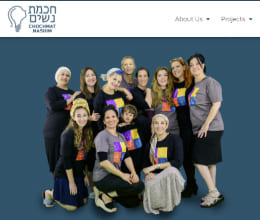Every time the Rabbinate sends out its statistics about divorce and the numbers of women waiting for a get, it is a slap in the face.
This year, the Israeli Rabbinate claimed that in 2022 there were only 187 agunot (chained women). It also declared that it applied sanctions on 41 male get-refusers and 4 female get-refusers. Sanctions can include revoking a driver’s license, restrictions on a bank account, not allowing them to leave the country, and jail.
The low numbers leave the public believing that get-abuse (the denying or purposeful delaying of giving a get or extorting a spouse in exchange for a get) is a minor problem, that the courts are doing just fine, and that the issue doesn’t warrant the reform and attention activists demand.
This adds insult to injury to those for whom this issue is an urgent one.
The problem with the rabbinate statistics is what they don’t include, the questions they don’t ask, and the information they don’t provide.
The Rabbinate’s numbers don’t include people waiting for a get whose spouses have not been ordered by the court to grant one. Those cases are “off the books.”
In Israel, a spouse is only considered an agun/ah if the judges have ordered the other spouse to grant a get. (Please note, there are also men who are waiting for a get. While far fewer and with less dire halachic consequences, the men whose wives refuse to accept a get are as wronged as the women whose husbands refuse to grant them.) This order does not happen easily for a woman, as a woman must prove that she has a “reason” to want a divorce, and the judges must agree that she is deserving of it. Many women await this ruling, and as long as they are waiting — often years — they are not counted in the courts statistics.
The numbers also don’t include those whose cases have been closed because they could no longer afford to keep them open, even though they were not resolved. This includes the cases that have been dragged out for years, with expenses including: hearings, lawyer costs, unpaid days off from work, and emotional turmoil. For example, one woman was taken to court by her husband for 14 years, as she raised their five young children alone. At that point, she simply couldn’t handle the physical and emotional costs and closed the case, essentially accepting that she would forever be agunah — and not counted by the Rabbinate as one.
The Rabbinate numbers don’t include women who have given up possessions, money, visitation, child support, and more in order to not be chained. Fear of get-refusal makes one vulnerable to extortion, and those who succumb to it are not included in the statistics.
Outside of Israel, information is even harder to obtain, there is practically no data on agunot or how long cases take in the beit din because there is no overseeing body, no method of recordkeeping, and, even within individual courts, data is neither gathered nor publicized. Calls to various batei din have yielded no real information. When asked about how many cases and how long they remain so, the responses were: “We’d have to check” and “I’m not sure.”
The real number of women waiting for a get or pawning their worldly possessions to be able to pay for one is in the thousands — not only in Israel but all around the Jewish world.
Almost everywhere there is a Jewish community, there are people working to help agunot. The phenomenon is as widespread as it is denied. Those who advocate for “letting the system work” must know that the system is absolutely broken.
It is critical to note that the modern day agunah is not a woman in the classic halachic literature whose husband is lost at sea or cannot be found after an earthquake or a war. She is a woman whose husband is present, but who refuses to grant her freedom.
Since a large part of finding solutions is identifying the problem, Chochmat Nashim, together with three other organizations at the forefront of agunah advocacy, sent out a detailed survey on divorce. Responses poured in from around the world.
We learned that:
- 44% of respondents (over 92% female) were pressured to exchange something for a get
- 39.5% suffered get-refusal
- 21% waited 3 or more years for a get
We also learned of the many things that go wrong in beit din and that, when the system is unresponsive, it fundamentally adds to the abuse of get-refusal, as does a lack of understanding of abuse to begin with, sending women back into dead marriages and telling them to try again. In fact, halacha is pretty clear about what the court is meant to be doing. In a situation where both sides want a divorce, there is no problem. But if a spouse refuses, a beit din should summon that party, evaluate the case, and apply whatever pressure it can to ensure that the husband gives the get and the wife accepts it. Too often the beit din makes no effort to reach out to the husband (in the Diaspora), for example, or will tell the wife that she should accept his extortion demands in exchange for the get.
The batei din will tell you that they rule strictly to prevent the problem of illegitimate children. But aren’t they ignoring the issue of all of the children not being born while women waste their fertile years languishing in limbo, unable to move on to a new relationship, while awaiting a get? The appropriate care taken to safeguard against future illegitimate children smacks of control and abuse for its own sake.
Please understand: All of those people and organizations working on behalf of agunot see the heavy toll get-refusal takes on the waiting spouse, the (former) couple’s children, and the integrity of the Jewish community. Custody, finances can all be worked out after a get is given and received, but denying a spouse’s freedom is abuse. Allowing one party to use Jewish law to chain another makes a mockery of Jewish marriage and Judaism itself.
—
To learn more about how the beit din should operate or if you have experienced beit din for divorce, please add your voice at ratemybeitdin.com


